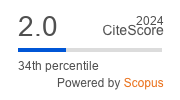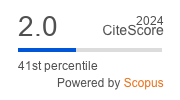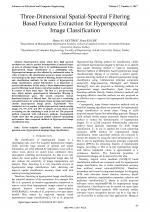| 2/2017 - 13 |
Three-Dimensional Spatial-Spectral Filtering Based Feature Extraction for Hyperspectral Image ClassificationAKYUREK, H. A. |
| Extra paper information in |
| Click to see author's profile in |
| Download PDF |
Author keywords
adaptive algorithms, feature extraction, gaussian noise, hyperspectral imaging, image classification
References keywords
image(26), hyperspectral(24), sensing(22), remote(22), classification(22), geoscience(13), images(10), tgrs(9), analysis(9), preserving(7)
Blue keywords are present in both the references section and the paper title.
About this article
Date of Publication: 2017-05-31
Volume 17, Issue 2, Year 2017, On page(s): 95 - 102
ISSN: 1582-7445, e-ISSN: 1844-7600
Digital Object Identifier: 10.4316/AECE.2017.02013
Web of Science Accession Number: 000405378100013
SCOPUS ID: 85020078642
Abstract
Hyperspectral pixels which have high spectral resolution are used to predict decomposition of material types on area of obtained image. Due to its multidimensional form, hyperspectral image classification is a challenging task. Hyperspectral images are also affected by radiometric noise. In order to improve the classification accuracy, many researchers are focusing on the improvement of filtering, feature extraction and classification methods. In the context of hyperspectral image classification, spatial information is as important as spectral information. In this study, a three-dimensional spatial-spectral filtering based feature extraction method is presented. It consists of three main steps. The first is a pre-processing step which include spatial-spectral information filtering in three-dimensional space. The second comprises extract functional features of filtered data. The last one is combining extracted features by serial feature fusion strategy and using to classify hyperspectral image pixels. Experiments were conducted on two popular public hyperspectral remote sensing image, 1%, 5%, 10% and 15% of samples of each classes used as training set, the remaining is used as test set. The proposed method compared with well-known methods. Experimental results show that the proposed method achieved outstanding performance than compared methods in hyperspectral image classification task. |
| References | | | Cited By «-- Click to see who has cited this paper |
| [1] W. He, H. Zhang, L. Zhang, and H. Shen, "Hyperspectral Image Denoising via Noise-Adjusted Iterative Low-Rank Matrix Approximation," IEEE Journal of Selected Topics in Applied Earth Observations and Remote Sensing, vol. 8, no. 6, pp. 3050-3061, 2015. [CrossRef] [SCOPUS Times Cited 252] [2] C. Aswathy, V. Sowmya, and K. P. Soman, "Hyperspectral Image Denoising Using Low Pass Sparse Banded Filter Matrix for Improved Sparsity Based Classification," Procedia Computer Science, vol. 58, pp. 26-33, // 2015. [CrossRef] [SCOPUS Times Cited 14] [3] B. Cui, X. Ma, X. Xie, G. Ren, and Y. Ma, "Classification of visible and infrared hyperspectral images based on image segmentation and edge-preserving filtering," Infrared Physics & Technology, vol. 81, pp. 79-88, 3// 2017. [CrossRef] [SCOPUS Times Cited 39] [4] S. Srivatsa, A. Ajay, C. K. Chandni, V. Sowmya, and K. P. Soman, "Application of Least Square Denoising to Improve ADMM Based Hyperspectral Image Classification," Procedia Computer Science, vol. 93, pp. 416-423, // 2016. [CrossRef] [SCOPUS Times Cited 9] [5] J. Huang, Y. Ma, X. Mei, and F. Fan, "A hybrid spatial-spectral denoising method for infrared hyperspectral images using 2DPCA," Infrared Physics & Technology, vol. 79, pp. 68-73, 11// 2016. [CrossRef] [SCOPUS Times Cited 7] [6] X. Kang, S. Li, and J. A. Benediktsson, "Spectralspatial hyperspectral image classification with edge-preserving filtering," IEEE transactions on geoscience and remote sensing, vol. 52, no. 5, pp. 2666-2677, 2014. [CrossRef] [SCOPUS Times Cited 697] [7] X. Li, J. Pan, Y. He, and C. Liu, "Bilateral filtering inspired locality preserving projections for hyperspectral images," Neurocomputing, vol. 164, pp. 300-306, 9/21/ 2015. [CrossRef] [SCOPUS Times Cited 36] [8] Y.-L. Chang, J.-N. Liu, C.-C. Han, and Y.-N. Chen, "Hyperspectral Image Classification Using Nearest Feature Line Embedding Approach," IEEE Transactions on Geoscience and Remote Sensing, vol. 52, no. 1, pp. 278-287, 2014. [CrossRef] [SCOPUS Times Cited 40] [9] H.-Y. Huang and B.-C. Kuo, "Double Nearest Proportion Feature Extraction for Hyperspectral-Image Classification," IEEE Transactions on Geoscience and Remote Sensing, vol. 48, no. 11, pp. 40344046, 2010. [CrossRef] [SCOPUS Times Cited 60] [10] S. T. Tu, J. Y. Chen, W. Yang, and H. Sun, "Laplacian Eigenmaps-Based Polarimetric Dimensionality Reduction for SAR Image Classification," IEEE Transactions on Geoscience and Remote Sensing, vol. 50, no. 1, pp. 170-179, 2012. [CrossRef] [SCOPUS Times Cited 106] [11] W. Li, S. Prasad, J. E. Fowler, and L. M. Bruce, "Locality-Preserving Discriminant Analysis in Kernel-Induced Feature Spaces for Hyperspectral Image Classification," IEEE Geoscience and Remote Sensing Letters, vol. 8, no. 5, pp. 894-898, 2011. [CrossRef] [SCOPUS Times Cited 123] [12] W. Li, S. Prasad, J. E. Fowler, and L. M. Bruce, "Locality-Preserving Dimensionality Reduction and Classification for Hyperspectral Image Analysis," IEEE Transactions on Geoscience and Remote Sensing, vol. 50, no. 4, pp. 1185-1198, 2012. [CrossRef] [SCOPUS Times Cited 466] [13] R. Luo, W. Liao, and Y. Pi, "Discriminative Supervised Neighborhood Preserving Embedding Feature Extraction for Hyperspectral-image Classification," TELKOMNIKA Indonesian Journal of Electrical Engineering, vol. 10, no. 5, pp. 10511056, 2012. [CrossRef] [14] Y. Wei et al., "Hyperspectral image classification using FPCA-based kernel extreme learning machine," Optik - International Journal for Light and Electron Optics, vol. 126, no. 23, pp. 3942-3948, 2015. [CrossRef] [SCOPUS Times Cited 24] [15] C.-C. Chang and C.-J. Lin, "Libsvm," ACM Transactions on Intelligent Systems and Technology, vol. 2, no. 3, pp. 1-27, 2011. [CrossRef] [SCOPUS Times Cited 28410] [16] Y. Bazi and F. Melgani, "Toward an Optimal SVM Classification System for Hyperspectral Remote Sensing Images," IEEE Transactions on Geoscience and Remote Sensing, vol. 44, no. 11, pp. 3374-3385, 2006. [CrossRef] [SCOPUS Times Cited 417] [17] G. Mountrakis, J. Im, and C. Ogole, "Support vector machines in remote sensing: A review," ISPRS Journal of Photogrammetry and Remote Sensing, vol. 66, no. 3, pp. 247-259, 2011. [CrossRef] [SCOPUS Times Cited 2824] [18] B. Demir and S. Erturk, "Hyperspectral Image Classification Using Relevance Vector Machines," IEEE Geoscience and Remote Sensing Letters, vol. 4, no. 4, pp. 586-590, 2007. [CrossRef] [SCOPUS Times Cited 188] [19] G. B. Huang, H. Zhou, X. Ding, and R. Zhang, "Extreme learning machine for regression and multiclass classification," IEEE Trans Syst Man Cybern B Cybern, vol. 42, no. 2, pp. 513-29, Apr 2012. [CrossRef] [SCOPUS Times Cited 5398] [20] M. Han and B. Liu, "A Remote Sensing Image Classification Method Based on Extreme Learning Machine Ensemble," Lecture Notes in Computer Science, vol. 7951, pp. 447-454, 2013. [CrossRef] [21] M. Pal, A. E. Maxwell, and T. A. Warner, "Kernel-based extreme learning machine for remote-sensing image classification," Remote Sensing Letters, vol. 4, no. 9, pp. 853-862, 2013. [CrossRef] [SCOPUS Times Cited 190] [22] M. J. McDonnell, "Box-filtering techniques," Computer Graphics and Image Processing, vol. 17, no. 1, pp. 65-70, 1981. [CrossRef] [SCOPUS Times Cited 199] [23] P. Saint-Marc, J. S. Chen, and G. Medioni, "Adaptive smoothing: a general tool for early vision," IEEE Transactions on Pattern Analysis and Machine Intelligence, vol. 13, no. 6, pp. 618-624, 1989. [CrossRef] [24] P. Perona and J. Malik, "Scale-space and edge detection using anisotropic diffusion," IEEE Transactions on Pattern Analysis and Machine Intelligence, vol. 12, no. 7, pp. 629-639, 1990. [CrossRef] [SCOPUS Times Cited 10670] [25] L. Yaroslavsky, Digital Picture Processing - An Introduction. Springer-Verlag Berlin Heidelberg, 1985. [CrossRef] [26] J.-S. Lee, "Digital image smoothing and the sigma filter," Computer Vision, Graphics, and Image Processing, vol. 24, no. 2, pp. 255-269, 1983. [CrossRef] [SCOPUS Times Cited 770] [27] C. Tomasi and R. Manduchi, "Bilateral Filtering for gray and color images," in ICCV '98, Sixth International Conference on Computer Vision, Washington DC, 1998. [CrossRef] [28] S. M. Smith and J. M. Brady, "SUSAN - A New Approach to Low Level Image Processing," International Journal of Computer Vision, vol. 23, no. 1, pp. 45-78, 1997. [CrossRef] [SCOPUS Times Cited 3014] [29] M. Elad, "On the origin of the bilateral filter and ways to improve it," IEEE Trans Image Process, vol. 11, no. 10, pp. 1141-51, 2002. [CrossRef] [SCOPUS Times Cited 704] [30] A. Buades, B. Coll, and J. M. Morel, "A Review of Image Denoising Algorithms, with a New One," Multiscale Modeling & Simulation, vol. 4, no. 2, pp. 490-530, 2005. [CrossRef] [SCOPUS Times Cited 3938] [31] J. V. Manjon, P. Coupe, L. Marti-Bonmati, D. L. Collins, and M. Robles, "Adaptive non-local means denoising of MR images with spatially varying noise levels," J Magn Reson Imaging, vol. 31, no. 1, pp. 192-203, Jan 2010. [CrossRef] [SCOPUS Times Cited 860] [32] P. Coupe, P. Yger, S. Prima, P. Hellier, C. Kervrann, and C. Barillot, "An optimized blockwise nonlocal means denoising filter for 3-D magnetic resonance images," IEEE Trans Med Imaging, vol. 27, no. 4, pp. 425-41, Apr 2008. [CrossRef] [SCOPUS Times Cited 984] [33] B. M. ter Haar Romeny, Front-End Vision and Multi-Scale Image Analysis. Springer Netherlands, 2003. [CrossRef] [34] H. L. Shang, "A survey of functional principal component analysis," AStA Advances in Statistical Analysis, vol. 98, no. 2, pp. 121-142, 2013. [CrossRef] [SCOPUS Times Cited 144] [35] J.-L. Wang, J.-M. Chiou, and H.-G. Müller, "Functional data analysis," Annual Review of Statistics and Its Application, vol. 3, pp. 257-295, 2016. [CrossRef] [SCOPUS Times Cited 692] [36] J. O. Ramsay and B. W. Silverman, Functional Data Analysis, 2nd Ed. New York: Springer, 2005. [CrossRef] [37] J. Yang, J.-y. Yang, D. Zhang, and J.-f. Lu, "Feature fusion: parallel strategy vs. serial strategy," Pattern Recognition, vol. 36, no. 6, pp. 1369-1381, 6// 2003. [CrossRef] [SCOPUS Times Cited 424] [38] M. F. Baumgardner, L. L. Biehl, and D. A. Landgrebe. 220 Band AVIRIS Hyperspectral Image Data Set: June 12, 1992 Indian Pine Test Site 3 [Online]. Available: [CrossRef] [39] . AVIRIS Salinas Valley and ROSIS Pavia University Hyperspectral Datasets. Available: http://www.ehu.es/ccwintco/index.php/Hyperspectral_Remote_Sensing_Scenes [40] R. Roscher and B. Waske, "Shapelet-Based Sparse Representation for Landcover Classification of Hyperspectral Images," IEEE Transactions on Geoscience and Remote Sensing, vol. 54, no. 3, pp. 1623-1634, 2016. [CrossRef] [SCOPUS Times Cited 34] [41] C. Li, Y. Ma, X. Mei, C. Liu, and J. Ma, "Hyperspectral Image Classification With Robust Sparse Representation," IEEE Geoscience and Remote Sensing Letters, vol. 13, no. 5, pp. 641-645, 2016. [CrossRef] [SCOPUS Times Cited 96] [42] W. Li, Q. Du, and M. Xiong, "Kernel Collaborative Representation With Tikhonov Regularization for Hyperspectral Image Classification," IEEE Geoscience and Remote Sensing Letters, vol. 12, no. 1, pp. 1-5, 2014. [CrossRef] [SCOPUS Times Cited 151] [43] L. Fang, S. Li, W. Duan, J. Ren, and J. A. Benediktsson, "Classification of Hyperspectral Images by Exploiting Spectral–Spatial Information of Superpixel via Multiple Kernels," IEEE Transactions on Geoscience and Remote Sensing, vol. 53, no. 12, pp. 6663-6674, 2015. [CrossRef] [SCOPUS Times Cited 372] [44] K. Xudong, L. Shutao, F. Leyuan, L. Meixiu, and J. A. Benediktsson, "Extended Random Walker-Based Classification of Hyperspectral Images," IEEE Transactions on Geoscience and Remote Sensing, vol. 53, no. 1, pp. 144-153, 2015. [CrossRef] [SCOPUS Times Cited 123] [45] J. Li, M. Khodadadzadeh, A. Plaza, X. Jia, and J. M. Bioucas-Dias, "A Discontinuity Preserving Relaxation Scheme for SpectralSpatial Hyperspectral Image Classification," IEEE Journal of Selected Topics in Applied Earth Observations and Remote Sensing, vol. 9, no. 2, pp. 625-639, 2016. [CrossRef] [SCOPUS Times Cited 78] Web of Science® Citations for all references: 0 SCOPUS® Citations for all references: 62,553 TCR Web of Science® Average Citations per reference: 0 SCOPUS® Average Citations per reference: 1,331 ACR TCR = Total Citations for References / ACR = Average Citations per Reference We introduced in 2010 - for the first time in scientific publishing, the term "References Weight", as a quantitative indication of the quality ... Read more Citations for references updated on 2025-07-01 10:32 in 294 seconds. Note1: Web of Science® is a registered trademark of Clarivate Analytics. Note2: SCOPUS® is a registered trademark of Elsevier B.V. Disclaimer: All queries to the respective databases were made by using the DOI record of every reference (where available). Due to technical problems beyond our control, the information is not always accurate. Please use the CrossRef link to visit the respective publisher site. |
Faculty of Electrical Engineering and Computer Science
Stefan cel Mare University of Suceava, Romania
All rights reserved: Advances in Electrical and Computer Engineering is a registered trademark of the Stefan cel Mare University of Suceava. No part of this publication may be reproduced, stored in a retrieval system, photocopied, recorded or archived, without the written permission from the Editor. When authors submit their papers for publication, they agree that the copyright for their article be transferred to the Faculty of Electrical Engineering and Computer Science, Stefan cel Mare University of Suceava, Romania, if and only if the articles are accepted for publication. The copyright covers the exclusive rights to reproduce and distribute the article, including reprints and translations.
Permission for other use: The copyright owner's consent does not extend to copying for general distribution, for promotion, for creating new works, or for resale. Specific written permission must be obtained from the Editor for such copying. Direct linking to files hosted on this website is strictly prohibited.
Disclaimer: Whilst every effort is made by the publishers and editorial board to see that no inaccurate or misleading data, opinions or statements appear in this journal, they wish to make it clear that all information and opinions formulated in the articles, as well as linguistic accuracy, are the sole responsibility of the author.



